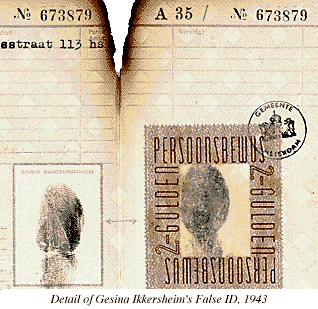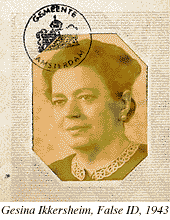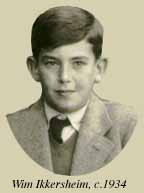 But I didn't go back to school that morning. At lunch hour a girlfriend came to our house and asked "why didn't Mia come to school this morning?"
But I didn't go back to school that morning. At lunch hour a girlfriend came to our house and asked "why didn't Mia come to school this morning?"
AB: It was so very important. It changed my whole life.
MIA: It changed the life of the whole family.
The whole month of August was school vacation. Queen's Day was celebrated on August 31. The first day of September, after the party, we went back to school.
 But I didn't go back to school that morning. At lunch hour a girlfriend came to our house and asked "why didn't Mia come to school this morning?"
But I didn't go back to school that morning. At lunch hour a girlfriend came to our house and asked "why didn't Mia come to school this morning?"
My mother told her, "she doesn't feel very well. Maybe tomorrow. It's better if she stays home for a day." In the afternoon, we left the house. That girlfriend and I we were the only two from our class of about forty children who survived the war.
It is so strange what you remember. In our house there was always a dish of candies on the table, but we were never allowed to eat them without permission. As we were leaving that last day I saw those candies, and just took them.
AB: It was exciting! I was thirteen or fourteen. I don't think I saw the dangerous part of it. We closed up the shop and the house, and walked away, wearing the star on our clothes. My mother had prepared them specially with just a few stitches that could be removed quickly. When we got to a little street behind the railway station, we took off the stars. Then we boarded the train to Huizen.
In Huizen we were received by a woman, a stranger to us.
MIA: Bertha van Deventer, a teacher.
AB: She had arranged places for us to go--one here, one there, two there; five people in one house was not possible. That was our entry into Huizen.
MIA: I lived for about a year with a family in the gardener's house on a large estate in Laren, close to Huizen. Then there was a raid, and I was put in a hiding place where I stayed for a very long time. They were hiding other things from the Germans besides me-- a radio, and sheep's wool. Finally, when I came out, the family decided the danger was too much for them. I would have to leave. That was when I went to Bochove.
AB: We were in many different places--maybe twenty-five or thirty.
MIA: For thirty-four months.
 WIM: It wasn't boring. I did some housekeeping, and a lot of reading. But we didn't go out, except sometimes after dark.
WIM: It wasn't boring. I did some housekeeping, and a lot of reading. But we didn't go out, except sometimes after dark.
AB: We knew there was no other way. It was too dangerous, so we had to accept it. But it was boring. Today, if I have to stay at home for a whole day, it's terrible.
MIA: When I came to a new place, I always looked at the bookshelves first, to see if there were books I hadn't read before.
After the war, the head of the Huizen library told me, "I knew where all the Jewish people were hiding because people who almost never used the library before suddenly were coming for books quite often."
Bochove's house:
MIA: There were times when you had to leave the place where you were staying. Then you could always count on the Bochove family for a few days, and they would look for another place for you. The Bochove family was great, but it was not a place to stay for a long time; it was too dangerous. There were so many people living there, plus all the people coming and going with passes, or food coupons. Too many people knew their name. Then of course, Mr. Juliard was always going in and out, and he was Jewish looking.
Pam Juliard:
MIA: Henny Juliard's husband, Pam, was a very special man.
AB: Pam was a bon vivant, all fantasy, and a lot of spirit. You could always laugh with him.
MIA: He and Bert got on very well together. He enjoyed life. I was on the street on my own, one time, when I saw a group of men walking with two or three Germans. I could see that they had been caught. Pam Juliard was one of them. He winked at me as if to say "tell them that I am here." How they caught him, I don't know, but I was the one who found out first. He had papers saying his profession was a vicar. The reverend from Huizen rescued him, telling the Germans, "He's my colleague, I need him. You've got the wrong person."
Raid
at Bochove's:
MIA: I remember very well the day that the Germans raided the Bochove house. I was at a bicycle shop next door, where one of my uncles was helping in the back. I almost never went out, but now he was preparing a bike especially for me so that I could go for a whole day's outing in the country, to have some fresh air. A woman I had never met came in, turned to me and said, "Don't go back. Stay here. The Germans are all over." It was so odd--things happened, and you never knew why. The people in that town seemed to know you even if you had a strange face. Maybe they knew that if you were a stranger, you must be Jewish. It was a very good village.
WIM: I was hidden with another family at the time, but I was helping Bochove, sharpening knives. The Juliards, Ans, my mother, and the parents of Kets de Vries were there.
 One of the people downstairs warned us that the Germans were outside, so we went into the hiding place--my mother, the mother of Kets de Vries, myself, I can't remember who else.
One of the people downstairs warned us that the Germans were outside, so we went into the hiding place--my mother, the mother of Kets de Vries, myself, I can't remember who else.
My father was out. He had gone to the municipal building to arrange for some papers. On his return, someone stopped him and warned him not to go back.
The Germans looked through the whole house, for about two hours--waiting and looking. While the Germans were downstairs, the mother of Kets de Vries went out of the hiding place. She thought the Germans would not be looking for an elderly woman like herself.
I can not remember very much: we were in the dark; there was plenty of tension. From inside the hiding place, we could hear the Germans. They were measuring the floor and the ceiling, to compare with the downstairs, to find out if there was something built into the wall.
Some of them were poking the ceiling downstairs with a stick , while others were listening upstairs, to hear if the noise was different.
MIA: My mother had been scraping red cabbage when the Germans came. I remember that her hands stayed red for days after.
That raid made her sick. She went kind of crazy from thinking--wondering where her children were. I cannot say, but it may have caused her death. We don't know exactly what kind of illness she had, but certainly the war had a great effect--those years of anxiety from being separated from her children, always looking for another hiding place.